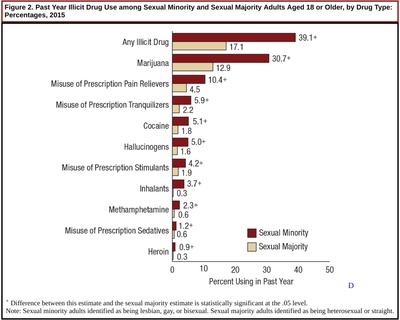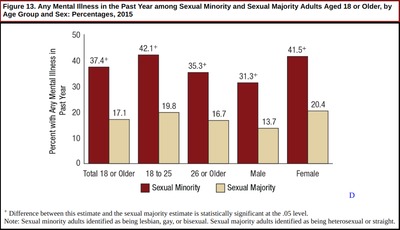
The research is in. Substance use and misuse are more prevalent among sexual minorities.
The Substance Abuse and Mental Health Services Administration (SAMHSA) conducted research investigating the link between sexual orientation, substance abuse, and mental health as part of its annual National Survey on Drug Use and Health (NSDUH) for the first time in 2015. The findings? “Sexual minorities were more likely than their sexual majority counterparts to have substance use and mental health issues.” Here’s a closer look at the data, along with what can be done to help solve the troubling issue.
A First of Its Kind Study
Research has long suggested that sexual minorities were at increased risk for substance use and mental health issues compared to their “straight” counterparts. It wasn’t until 2015, however, the SAMHSA first included questions in the NSDUH that would identify sexual minorities — making it the first “nationally representative, federally collected comprehensive information on substance use and mental health of adults by sexual orientation.” The hope was that concrete evidence will spur researchers to look more closely at the issues driving the disparity.
From Use to Abuse
NSDUH looked at 10 categories of illicit drugs, including marijuana, cocaine, heroin, hallucinogens, inhalants, meth, prescription pain relievers, tranquilizers, stimulants, and sedatives. The survey reveals that for every single one of these categories, sexual majority respondents — who made up just 4.3 percent of surveyed adults over the age of 18 — were more likely to be “past year users” than their sexual majority counterparts.

Across all illicit drugs, use was higher among sexual minorities. (Figure 1. Adapted from Sexual Orientation and Estimates of Adult Substance Use and Mental Health: Results from the 2015 National Survey on Drug Use and Health.)
For example, while 39.1 percent of sexual minority adults had used illicit drugs in the prior year, just 17.1 percent of sexual majority adults responded the same. Meanwhile, more than 30 percent and 10 percent of sexual minority adults had used marijuana or misused prescription painkillers over the same period of time, compared to 12.9 and 4.5 percent, respectively, for sexual majority adults.
This pattern was consistent across every drug category, as well as when broken out across age and gender demographics. For example, 41.1 percent of sexual minority women were likely to report past year illicit drug use compared to 13.9 percent of sexual minority women. The margin was slightly smaller for men: 36.3 percent versus 20.4 percent.

The pattern also remained the same across genders and ages. ( (Figure 2. Adapted from Sexual Orientation and Estimates of Adult Substance Use and Mental Health: Results from the 2015 National Survey on Drug Use and Health.)
The phenomenon also held true for tobacco and alcohol use. Not only were sexual minorities more likely to have used tobacco in the 30 days before the interview, but they were also more likely to be current cigarette smokers: 32.2 percent compared to 20.6 percent; they were also more likely to be current alcohol drinkers and/or binge drinkers.
It follows that as sexual minority adults are more likely to use substances that they’re also more likely to develop substance use disorders (SUDs): 15.1 percent of sexual majority adults compared to 7.8 percent of sexual majority adults.
One thing both groups did share? Regardless of their sexual identity, most people who needed substance use treatment had SUDs in the prior year.
The Mental Health Connection
Given what we know about concurrent disorders, it’s hardly surprising that mental illness incidences were also higher among sexual minority adults — more than twice as prevalent, in many cases. The gap became even more significant when the data separated out serious mental illnesses.

The pattern for mental health issues among sexual minorities echoes the pattern for substance use and abuse. (Figure 3. Adapted from Sexual Orientation and Estimates of Adult Substance Use and Mental Health: Results from the 2015 National Survey on Drug Use and Health.)
The good news is that a higher percentage of sexual minority adults received mental health services than their sexual majority peers. Still, the overall trend is troubling. “Taken together, about half or more of adults who had AMI did not receive mental health services in the past year, regardless of their sexual identity,” the report says.
While this data sheds important light on an important topic, it doesn’t explain why these differences occur, although certainly, the stressors experienced by sexual minority adults are a factor. Concludes the report, “An important topic for future research will be further study of the factors that are associated with an increased likelihood of substance use or mental health issues among sexual minorities (i.e., risk factors) and factors among sexual minorities that are associated with a decreased likelihood of substance use or mental health issues (i.e., protective factors).”
Just as these factors are an important part of understanding the increased risk of substance abuse and mental health issues among sexual minorities, so is addressing them a critical part of successful treatment. To learn more about Harris House’s targeted substance abuse treatment programs for LGBTQ community members in St. Louis, contact us today.







